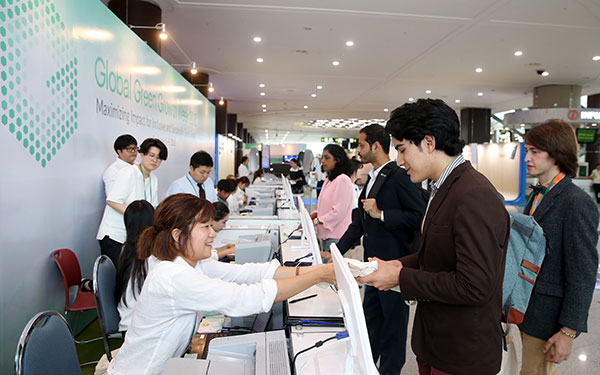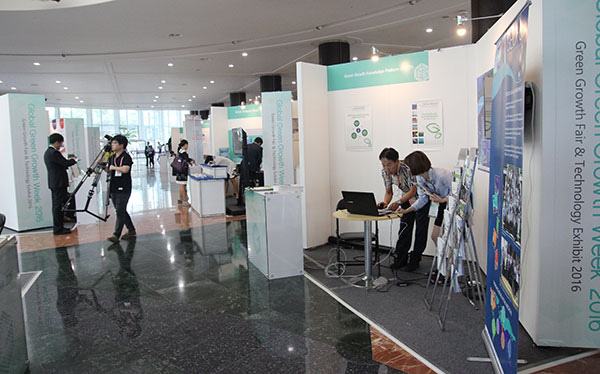GGGWeek2016 kicked off in South Korea
 |
GGGWeek2016, running during September 5-9, demonstrates current and emerging green growth trends from leading experts from both the public and private sectors.
The event, which will showcase leadership and expertise on green finance, project development, and technology solutions, connects green technology providers with project developers and financers to negotiate deals.
GGGWeek2016 will also survey and source new green products and services related to energy, water, transportation, and construction.
 |
The event will include more than 60 discussion sessions. For example, the Global Green Growth Summit will convene over 300 heads of private and public financial institutions, heads of governments, and project developers from more than 30 countries.
The event’s Asia Regional Policy Dialogue on the coal-renewables dilemma will bring together more than 100 ministers, CEOs, and think-tanks from Asia’s leading economies.
Meanwhile, GGGWeek2016’s Green Growth Knowledge Platform Annual Conference will bring together over 300 experts from more than 40 leading policy research institutions.
Besides, World Bank Partnership for Market Readiness is focused on innovative approaches to greenhouse gas mitigation using market regulation mechanisms and carbon pricing.
 |
The Meeting of the Inclusive Green Growth Partnership will bring together multilateral development banks and United Nations regional commissions.
There will also be Country Sessions that will focus on showcasing Global Green Growth Institute’s (GGGI) projects on the ground to highlight green investment opportunities. In addition, the New Climate Economy Africa Initiative Launch will support African policymakers as they navigate the nexus between economic development and climate change.
International Emissions Trading Association Carbon Forum: Asia Carbon Market Trade Fair and Conference will bring together more than 500 participants from more than 40 countries.
Notably, the United Nations Framework Convention on Climate Change (UNFCCC), the International Emissions Trading Association (IETA), and the Asian Development Bank (ADB) partnered with GGGI for the Asian Pacific Carbon Forum.
Topics on the agenda include carbon markets for climate change mitigation, with special attention to how co-benefits from climate action can build resilience; finance and climate friendly policies that can be deployed at the national level to deliver sustainable development, as part of countries’ Intended Nationally Determined Contributions (INDCs) under the Paris Agreement; and new carbon markets and mechanisms in the Asia-Pacific.
The forum also deals with aligning current efforts with the Paris Agreement, and supporting INDC implementation through market and non-market based approaches, such as carbon pricing, capacity-building, technology transfer, innovations, and new ideas.
According to the International Energy Agency (IEA), in terms of financing green energy, global energy demand is set to increase by 37 per cent by 2040. Growth in demand will precipitate both the expansion of existing grid networks and the development of micro-grids and even smaller-scale solutions, such as mobile battery charging stations.
In addition to servicing the needs to expand energy production and access, if countries are to meet the ambitious targets set at the 21th Conference of Parties in Paris, existing fossil fuel-based energy capacity will have to be replaced with more sustainable alternatives.
Whether or not green finance will flow at a sufficient scale and speed to ensure that these changes happen on a sustainable pathway will depend on the demonstration of transferable finance models.
Meanwhile, financing green cities, providing affordable housing, transport, and basic services to existing urban populations is an on-going challenge for both developed and developing countries.
The urbanisation of the world’s population in 2014 stood at 3.9 billion. According to the UNDP, by 2050 a further 2.5 billion people will have moved to urban areas. Asia and Africa will see 90 per cent of this increase.
Meeting the need of this growing urban population presents a key set of challenges and opportunities for proponents of green growth. The higher population density in cities will allow for economies of scale and greater efficiency in the provision of services. It will also bring opportunities to provide clean and efficient mass transit systems, as well as district heating and cooling that cannot be extended to dispersed rural populations.
The provision of finances for these services also presents a unique set of challenges, encompassing not just state-level and private sector action, but increasingly local city government in the form of city councils and mayors.
The Global Green Growth Summit is GGGI’s flagship biennial event aimed to stimulate action-oriented discussion on economic growth, social inclusion, and poverty reduction through green growth policy, actions and investment.
What the stars mean:
★ Poor ★ ★ Promising ★★★ Good ★★★★ Very good ★★★★★ Exceptional
Latest News
More News
- Foreign leaders extend congratulations to Party General Secretary To Lam (January 25, 2026 | 10:01)
- 14th National Party Congress wraps up with success (January 25, 2026 | 09:49)
- Congratulations from VFF Central Committee's int’l partners to 14th National Party Congress (January 25, 2026 | 09:46)
- 14th Party Central Committee unanimously elects To Lam as General Secretary (January 23, 2026 | 16:22)
- Worldwide congratulations underscore confidence in Vietnam’s 14th Party Congress (January 23, 2026 | 09:02)
- Political parties, organisations, int’l friends send congratulations to 14th National Party Congress (January 22, 2026 | 09:33)
- Press release on second working day of 14th National Party Congress (January 22, 2026 | 09:19)
- 14th National Party Congress: Japanese media highlight Vietnam’s growth targets (January 21, 2026 | 09:46)
- 14th National Party Congress: Driving force for Vietnam to continue renewal, innovation, breakthroughs (January 21, 2026 | 09:42)
- Vietnam remains spiritual support for progressive forces: Colombian party leader (January 21, 2026 | 08:00)
















 Mobile Version
Mobile Version